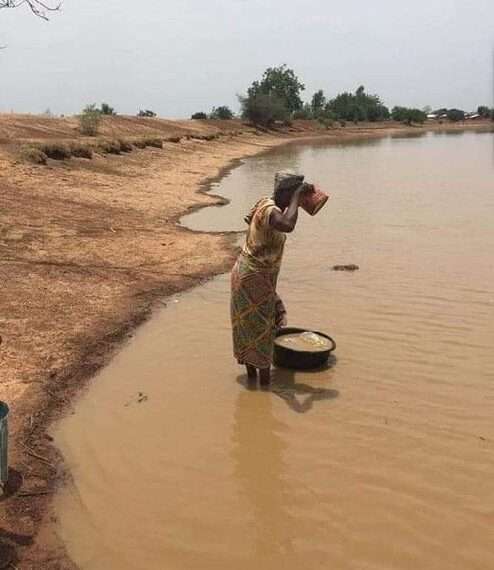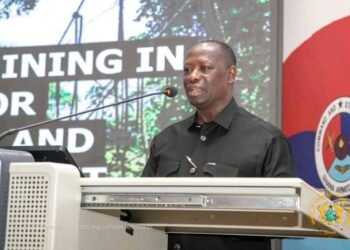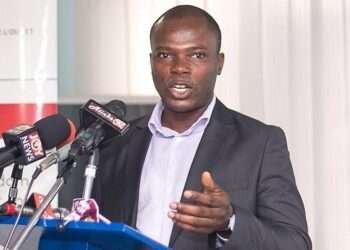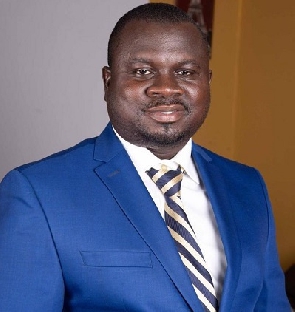Senior Lecturer at the University of Energy and Natural Resources, Dr. Moomen Abdul Wadood has outlined two key issues currently facing the nation. The President’s appeal regarding the impending strike by organized labor and the ongoing debate surrounding a complete ban on mining activities.
Dr. Wadood highlighted both on the economic implications of a mining ban and the importance of swift action by the government in addressing labor concerns.
While acknowledging the administrative nature of the President’s appeal, Dr. Wadood emphasized that this situation requires immediate attention.
“The President’s appeal for more time is that highly administrative, and we wouldn’t expect the President to see the Trade Union Congress and say, ‘Please go ahead and have your strike next week.”
Dr. Moomen Abdul Wadood Senior Lecturer at the University of Energy and Natural Resources
However, Dr. Wadood expressed concern that despite the President’s previous commitment, there has been little progress. He noted; “My concern is, way back in 2020, 2021, the President [said that he has put his] presidency on the line. And this is about four years ago.”
Dr. Wadood recalled, referencing the President’s past remarks on tackling issues such as illegal mining (galamsey) and labor unrest.
He argued that four years is more than enough time for the President to act on his promises, and the lack of meaningful intervention is cause for alarm.
Despite the President’s request for more time, Dr. Wadood believes that the labor unions have been patient, offering the government ample space to resolve their grievances.
“Indeed, I can also even infer that the labor unions are still buying time to allow space for the President to take action,” he added, underscoring the labor unions’ willingness to engage in dialogue rather than resort to immediate action.
The Implications of a Potential Strike
Dr. Wadood stressed the gravity of the current situation, pointing out that the nation cannot afford any further delays.
He noted that the organized labor strike if it materializes, would have dire consequences for the government and the President’s administration. He emphasized; “From today even up to next week, it’s still enough time for the President to take action. Mind you that we are actually in a critical movement.”
With the nation already in a precarious economic state, any labor disruption could further destabilize the country, particularly in critical sectors such as education, healthcare, and energy. He reiterated; “Unfortunately, if the strike comes off, it’s actually going to be a serious dent on the government and particularly on the President’s reign as President.”
Dr. Wadood said, emphasizing that failure to resolve the labor issue could tarnish the President’s legacy.
The Call for Compromise
In light of the looming crisis, He urged the President and the labor unions to work towards a resolution that would prevent the strike from occurring.
“At this point, we just have to compromise. Everybody has to compromise. The President has to compromise [on] certain things. The labor union would also have to compromise certain things.”
Dr. Moomen Abdul Wadood Senior Lecturer at the University of Energy and Natural Resources
Dr. Wadood highlighted that such a compromise would not only avert the strike but also pave the way for a more sustainable solution to the challenges facing the country.

The Mining Ban Debate: A Plea for Balance
Dr. Wadood also took the opportunity to comment on the ongoing calls for a complete ban on mining in Ghana, a debate that has grown in intensity due to the negative environmental and social impacts of illegal mining (galamsey).
“Let me plead with the general public and particularly the organized Labor that a complete ban on mining will not actually be healthy for the economy of the country.”
Dr. Moomen Abdul Wadood Senior Lecturer at the University of Energy and Natural Resources
He explained that mining remains a key driver of the country’s economic growth, providing jobs, and foreign exchange, and contributing to government revenues.
However, he differentiated between large-scale mining and illegal small-scale mining (galamsey), in which he agreed there should be a total ban on all mining activities.

He also raised concerns about the misuse of exploration permits, noting that some galamsey operators exploit these permits to engage in illegal activities under the guise of legitimate exploration. “Some of the galamsey activities actually go undercover of exploration to do that,” he said, calling for stricter oversight of the mining sector.
Meanwhile, in discussing land ownership and mineral resource extraction in Ghana, Dr. Wadood highlighted the unique relationship between local land ownership and the state’s control over natural resources beneath the land. According to him the Ghanaian law, while chiefs and local people may own the land, the minerals found beneath are the property of the people, represented by the state.
He emphasized that the government, particularly the president, should take a leading role as “Primus Inter Pares” in ensuring the proper management and safeguarding of these resources, especially in cases involving illegal mining or resource extraction.
“The rule of Ghana is that the mineral beneath the land belongs to the people that’s in the present interest.” This means that any benefits from mineral extraction should serve the broader national interest rather than just the local community. Additionally, Dr. Wadood underlined the state’s authority to intervene when necessary. He noted; “The state can take compulsory acquisition and also take compulsory deployment for protection and safeguarding our resources.”
This suggested that the government has both the legal right and responsibility to step in to manage, protect, or take control of natural resources when issues arise.
This underscored the importance of the government’s role in managing mineral resources for the benefit of the nation while acknowledging the land ownership of local communities, with the president acting as Primus Inter Pares in these efforts.
Dr. Moomen Abdul Wadood’s statement provided critical insights into the dual crises of an impending labor strike and the debate over mining in Ghana.
He emphasized the need for compromise on labor issues, while also cautioning against a blanket ban on mining activities. His call for balanced solutions, rather than extreme measures, offers a pragmatic path forward as the nation grapples with these significant challenges.
READ ALSO; Stonebwoy Implores Government To Stop Galamsey Menace



















